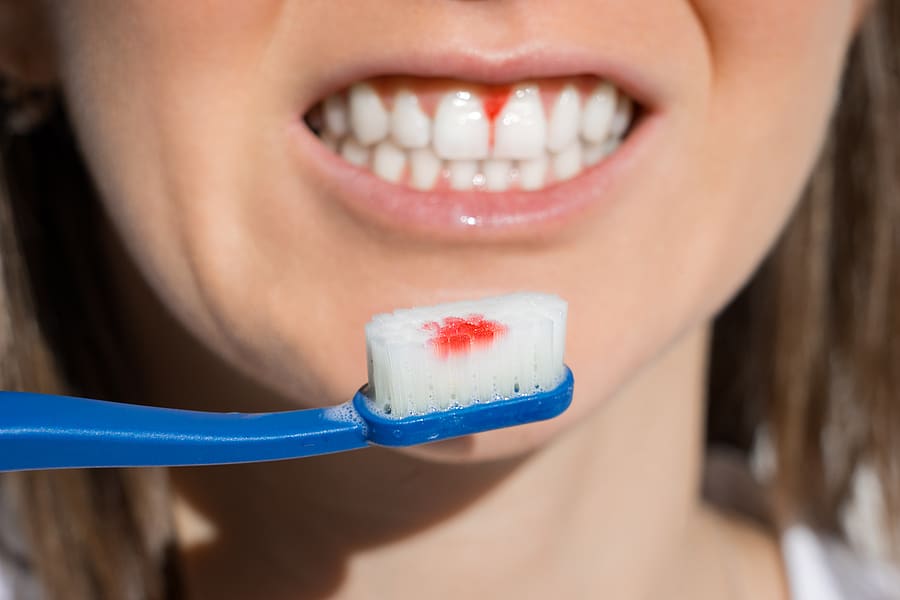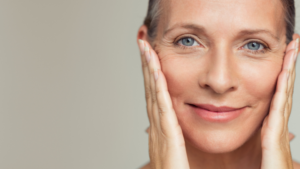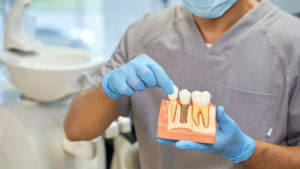Gum disease is the number one cause of tooth loss in adults here in the UK. But did you know that, in most cases, it’s completely preventable? There are many warning signs on the road to advanced gum disease, and by visiting a hygienist before it’s too late, you can spare yourself the need for tooth extraction and restorative treatment. If you have gum disease that has reached an advanced stage, you should visit us as soon as possible to receive treatment to save your natural teeth.

What is gum disease, and how do you spot it?
Gum disease is a common condition affecting supporting tissues and structures around your teeth. It causes swelling, inflammation and sometimes pain. If left untreated, gum recession and tooth loss can occur.
Whilst some symptoms will indicate the presence of gum disease because it is such a slow-progressing condition, regular hygienist appointments are paramount if you want to prevent unpleasant symptoms. We’ll talk a little more about the role of a hygienist in preventing the development of gum disease a little later in the blog.
The two main types of gum disease are:
Gingivitis: this is the early stage of gum disease where the gums begin to become inflamed. If you have gingivitis, you will have a buildup of plaque along your gum line, a sticky substance caused by bacteria that collects each time you eat. If you have substantial plaque, you may also experience bleeding gums when you brush and floss. Having plaque removed from your gum line by a hygienist is essential, as you cannot remove it through brushing alone.
Periodontitis: this is the stage of gum disease that occurs when gingivitis is not treated and can go on to affect the bones and ligaments that hold your teeth in position.It’s common for the gums to pull away from your teeth, leaving vulnerable pockets open to plaque buildup. This is particularly problematic as plaque in these areas cannot be reached with a toothbrush, meaning structural damage to bones and ligaments eventually occurs. In addition to gum recession, typical signs of periodontitis include chronic bad breath, an unpleasant taste in your mouth, sensitive teeth, loose teeth and gum abscesses.
Is it too late for me to have treatment?
It’s never too late to seek treatment for gum disease, and the degree of treatment you require will depend on how advanced it is. If your hygienist diagnoses you with periodontitis, they may do one or more of the following:
- Collect diagnostic information, including measurements of the depth of the gaps between your teeth and gums with X-rays.
- Perform root planing treatment (a deeper version of a traditional scale and polish) to remove the extreme buildup of plaque and tartar. This will likely be performed over multiple appointments to allow your hygienist to thoroughly remove plaque and tartar in difficult-to-access areas.
- In very severe cases, advanced gum disease causes tooth loss. After examining the health of your gums, if you have very loose teeth, we may decide that an extraction is in the best interests of your future gum health. Here at our Hammersmith dental practice, we offer a variety of tooth replacement treatments, including dental implants, which are considered the gold standard.
Before any extraction, we will always take you through your options for replacing the missing tooth or teeth, advise you on what we believe would be in the interests of your smile, and listen to what expectations are. All restorations are made by an experienced dental technician who will create crowns, bridges and dentures that will look and feel authentic.
Hygienists and the crucial preventive role they play
As we’ve already mentioned, to keep gum disease at bay, a preventive mindset is essential. When you visit your hygienist at 92 Dental here in Hammersmith, you can expect the following from your appointment:
- An assessment of how effective your cleaning routine is and whether or not gum disease is present.
- Your hygienist will scale and polish your teeth to remove plaque and tartar that would otherwise put you at risk of gum disease progression.
- Demonstrate and explain how you can get the best out of dental aids like brushes, floss and mouthwash.
- Educate you on how to integrate the right foods into your diet to evade tooth erosion and cavities.
- Offer individualised care and advice based on your unique needs.
Anxious about coming in for treatment? Don’t panic
Around 75% of adults experience a fear of the dentist. Most people who experience this only attend when they have a dental emergency that’s come about through extreme decay or gum disease. Please know that we are never here to judge, only to help get you back on the course of healthy gums. We can also offer sedation for nervous patients who require procedures, both non-surgical and surgical. We always feel privileged to be a part of patient journeys to creating healthy relationships with how they feel about coming to the dentist.
Our practice environment here in Hammersmith is friendly and welcoming, allowing you to feel at home from the moment you visit.
If you are interested in booking a routine hygienist appointment at our Hammersmith dental practice, please call our receptionist Jenny on 020 8748 1381.




